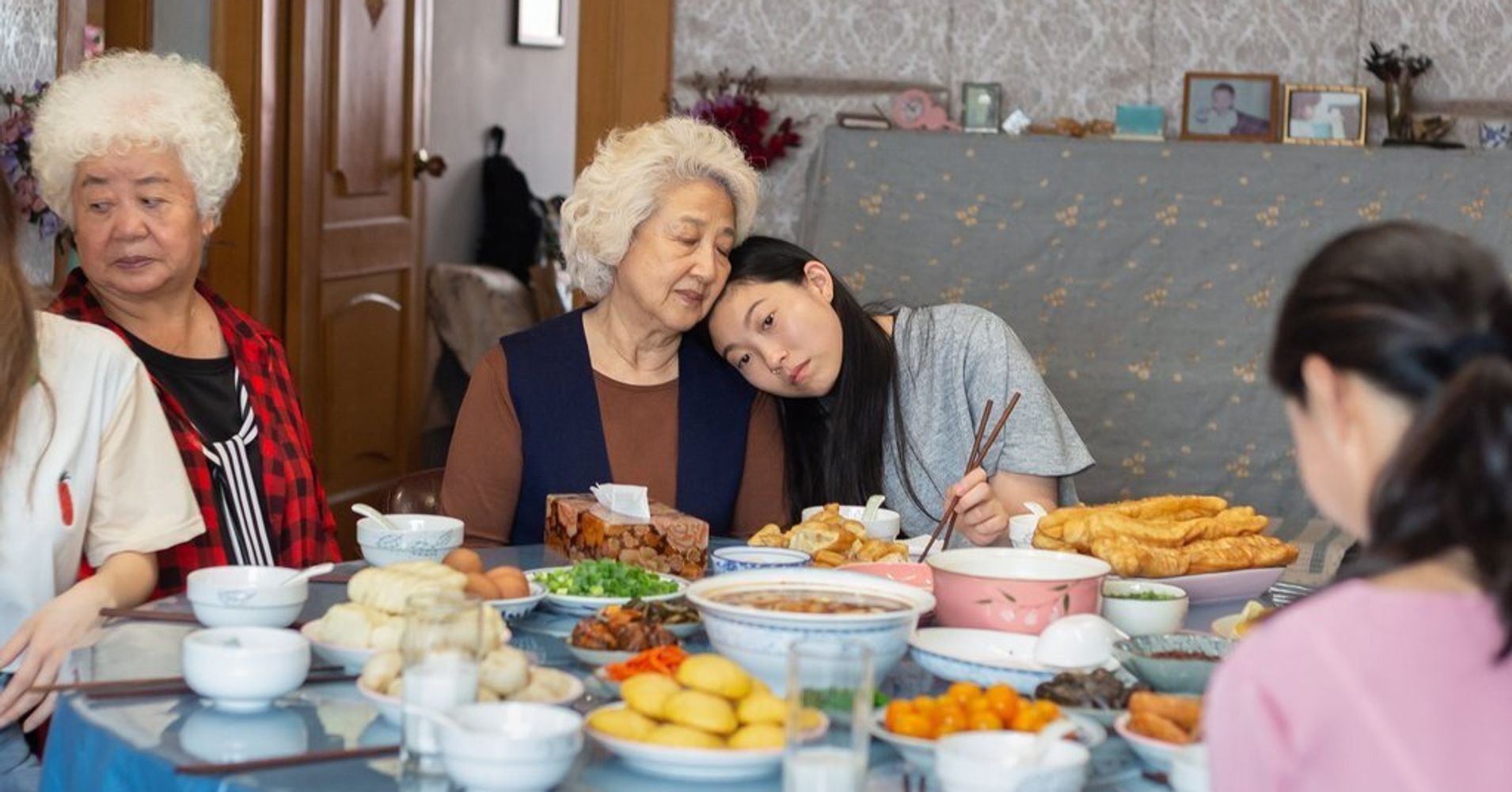[ad_1]
“The Farewell” is a movie about death, the point at which petty hang-ups like money and prestige should cease to matter. Of course, that’s usually not what happens, even for those who’ve made peace with their imminent passing. However, in this film, Nai Nai (Shuzhen Zhao), the grandmother of Brooklyn-based protagonist Billi (Awkwafina), doesn’t know she’s dying.
But the viewer knows, and that dramatic irony softens the film’s heartbreak. As is common in Chinese households, Nai Nai’s relatives decide not to tell her that she’s been diagnosed with advanced lung cancer, preferring instead to keep her final days as lively as possible. For the first time in years, Nai Nai’s extended clan — scattered across America, Japan and China — will convene in her native Changchun for a wedding that’s really an elaborate ruse to say goodbye. No one can break down or tell Nai Nai that her preoccupations don’t matter — not even when she scolds the event’s caterers for preparing crab instead of lobster, worrying that people will think she’s stingy. Appearances are everything, and lobster denotes affluence. “We can’t look cheap,” Nai Nai insists.
“The Farewell” is “based on an actual lie” from director Lulu Wang’s life. It stands among a handful of recent films that have placed nuanced class dynamics in the background of stories about love, family and personal growth. At a time when minimum-wage standards and income inequality are major political talking points, it’s powerful to see big-hearted movies like “The Farewell,” “Lady Bird,” “Sorry to Bother You” and “Support the Girls” give weight to the economic strictures that touch everyone’s lives. Whereas poverty has long been a subject in cinema, from “The Grapes of Wrath” to “Beasts of the Southern Wild,” depictions of middle-class families have tended to forego money discussions.
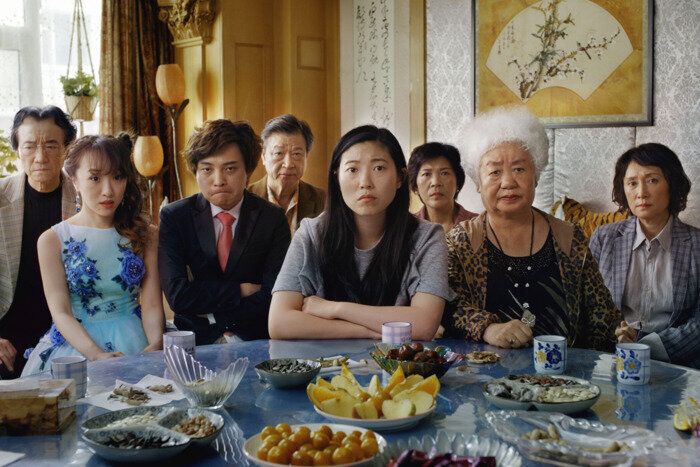
Wang sees class for what it is: a given. A person can rise above the status they’re born into, but no one is exempt from the stratification that defines society. For the characters in “The Farewell,” some of whom fled China seeking a better life, little will shake their sense that prosperity might be fleeting. That this is a subtle throughline rather than the central conceit underscores why the film shines. Wang’s script takes a trope common to Greek tragedy and Shakespearean comedy — giving the audience crucial information but concealing it from a character who would otherwise behave differently — and mines it for maximum pathos. A dying octogenarian (or any octogenarian; hell, any person) demanding lobster as a status symbol seems trivial, which is precisely what makes the exchange so meaningful: Even in old age, the insecurities that plague us are impossible to dismiss.
“It’s quite funny because, in some ways, even with potential terminal illness, sometimes people’s personalities get even greater,” Wang told HuffPost. “We don’t necessarily change. I think that’s a very Hollywood, very American perspective, suddenly [not caring] about the things you’ve cared about your entire life.”
As Nai Nai plans a fancy wedding for her grandson, we’re able to imagine the years she spent feeling inferior next to wealthier peers, or being fed ideas that she should emulate Western ideals. At one point, she mentions a time when China rationed eggs due to scarce resources; at another, Nai Nai and her relatives argue over whether it’s right to send their children to the United States for college, and what it means if those children elect not to return home to raise families of their own. At the center of these conversations is money: what it means and how it flows in different parts of the world.
All things considered, Billi and Nai Nai’s family lives relatively well. They don’t want for food. They live in decent homes. They wear respectable clothes. But sometimes, movies like this ignore that satisfying meals and comfortable domesticity don’t invalidate financial woes.
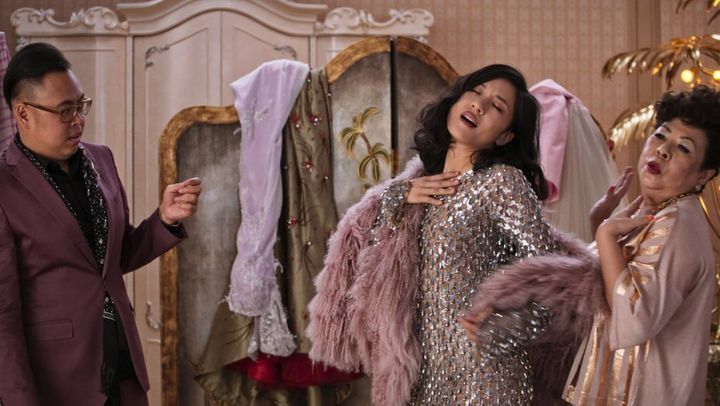
In some ways, “The Farewell” achieves what “Crazy Rich Asians” — another Awkwafina movie, albeit one with a much higher budget — couldn’t. “Crazy Rich Asians” set out to criticize the snobbery that New York professor Rachel Chu (Constance Wu) faces from her fiancé’s ludicrously wealthy family, but it wound up romanticizing the exact opulence it wanted to indict. The film reveled in the image of an absurd wedding that featured a stream of water trickling down the aisle. It made over-the-top luxuries feel aspirational, even while villainizing sophisticates who look down on others with lesser means. There was a makeover scene set to “Material Girl.” Everything led to Rachel’s equally absurd engagement party, which included synchronized dancers, an infinity pool, intricate fireworks and sweeping shots of upper-crust Singapore. By that point, any sense that the characters had a deeper understanding of class disparities flew out the window.
“‘Crazy Rich Asians,’ look, everything about it is big,” Awkwafina, who broke through last year with a scene-stealing role in “Ocean’s 8,” told HuffPost. “It’s very visual. There’s a lot of things going on in that movie. It’s a celebratory movie, filled with joy. There are a lot of issues to be explored, but I think overall it falls into a genre that’s a little bit more pleasing on the eye and digestible. But when it comes to ‘The Farewell,’ that’s real. It’s realer than most movies ever will get. That was the main difference there.”
Even as her profile and bank account swell, Awkwafina — born Nora Lum, the daughter of immigrants who relocated to Queens — knows a thing or two about class. Her upbringing, she said, looked less like “Crazy Rich Asians” and more like “The Farewell.” A budding rap career, which spawned her stage name, helped her leave a $9-an-hour bodega job and transition to Hollywood. Today, she has the same “shitty” rent-controlled New York apartment that she’s lived in for the past seven years.
Awkwafina’s attention to the lived-in nuances that make a person complex turn her performance in “The Farewell” into something wonderful. When we first meet Billi, she’s strolling through the streets of Brooklyn, answering a phone call from Nai Nai. Her shoulders are slumped in an unassuming manner, and her attire is unremarkable. It’s clear that she doesn’t define her worth with material means.
When Billi and her parents arrive in China, their middle-class heritage is always present, often without being remarked upon. It’s a fact of life. Nai Nai’s perfectly respectable apartment is cluttered and colored with slightly dingy pastels. When Billi checks into a nearby hotel, it’s the equivalent of a Ramada Inn. Only at the wedding, where Nai Nai wants to make an impression, do things brighten to reflect the pursuit of elegance. Of course, that wedding is still nothing like the one in “Crazy Rich Asians;” it’s a wedding befitting “Crazy Middle-Class Asians,” the title Wang said she jokingly applies to her film.
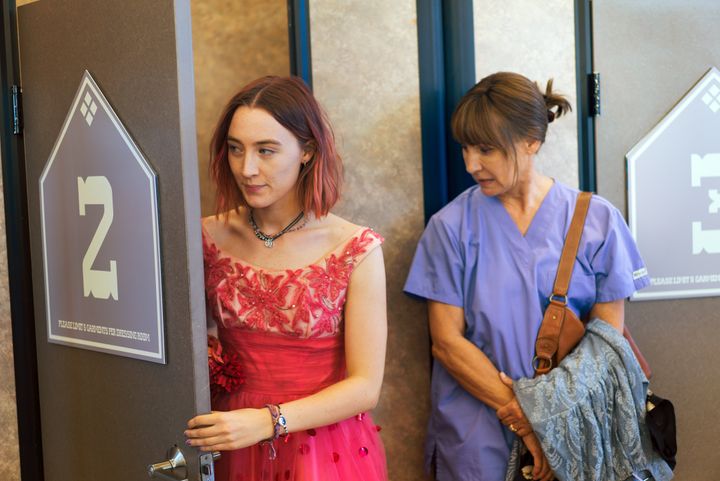
A lot of particulars in “The Farewell” are specific to Chinese culture, but they also resonate for American audiences accustomed to the ways money hovers on the periphery of everything. “Lady Bird,” Greta Gerwig’s award-winning 2017 coming-of-age charmer, positioned class in a similar way. It’s a movie about teenage rites, but class issues are at play in everything the titular character (Saoirse Ronan) experiences. When Lady Bird, a high school senior desperate to leave her native Sacramento behind, asks her overworked mother, Marion (Laurie Metcalf), to buy a $3 bridal magazine at the grocery store so she can read it in bed, Marion responds, “That’s something rich people do. We are not rich people.” Later, when Lady Bird is upset over the way a boy (Timothée Chamalet) treated her, Marion suggests they embark on their “favorite Sunday activity,” which means attending open houses for McMansions they can only fantasize about affording.
“Sometimes envy doesn’t allow you to see what you have, and particularly, I think, in America, you’re always looking at the more, more, more,” Gerwig, who wanted to include undertones about the “erosion of the middle class,” told me in 2017. “You can’t see what’s in front of you.”
Nai Nai, for her part, sees what’s in front of her — minus the whole death thing. She’s grateful that all of her relatives are in the same city for the first time in years. She’s thrilled to be able to feed her grandchildren and send Billi home with a little extra cash, telling her not to spend it on something important like rent. In her own feisty way, she is savoring life. Even if she’s ignorant about her cancer diagnosis, she knows her days with Billi are numbered. When Nai Nai isn’t arguing about lobster, it’s moving to see someone so steeped in her own history — economic and otherwise — find peace without sanding down the rougher edges.
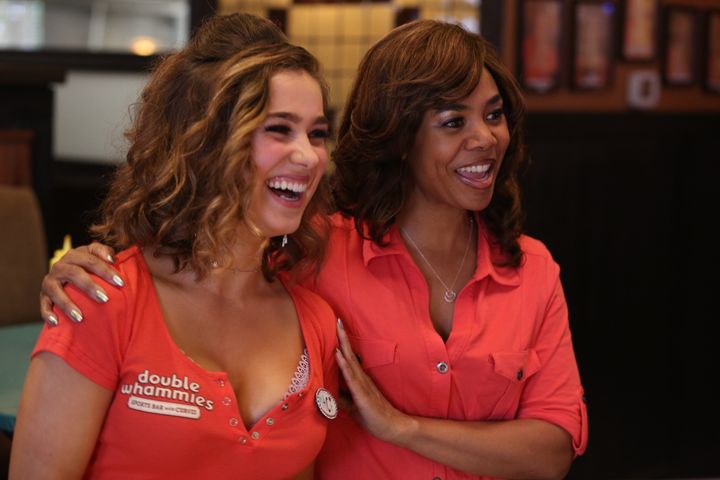
In portrayals that center class more prominently, peace is somewhat elusive. Last year’s “Sorry to Bother You” is a surreal romp about a hard-up telemarketer (Lakeith Stanfield) who climbs the corporate ladder, only to discover insane corruption requiring him to literally sell himself to the company if he wants to become wealthy. He refuses the offer, knowing it requires forfeiting what he’d almost achieved. Rising up against the man and paying the consequences is its own sacrifice.
And in the slice-of-life dramedy “Support the Girls,” an even-keeled Texas sports-bar manager (Regina Hall) finds herself out of a job right as a monolithic Hooters-style franchise sets up shop in town. No one works harder or deserves more prosperity. But how can she get ahead when doing so means sacrificing her dignity — or worse? Sometimes all that’s left is to scream into the void, hoping the universe will answer your cries.
Maybe, in a way, Nai Nai has spent her whole existence screaming into the void, and seeing her family reunite one more time is the universe’s response. “The Farewell” ends on a hopeful note, even though it’s shrouded in ideas about death. Nai Nai stuck to her principles, and that’s what matters. At the very last second, she sees the love that’s right in front of her. The lobster and the eggs and the foreign universities were mere footnotes on the journey.
“In some ways, we’re all dying, so if we think about it that way, should we all just be better people and have a great perspective on life?” Wang said. “We don’t. It was just about the humanity of it all, even in the midst of this tragedy.”
“The Farewell” is now in limited release. It opens nationwide on Aug. 2.
REAL LIFE. REAL NEWS. REAL VOICES.
Help us tell more of the stories that matter from voices that too often remain unheard.
[ad_2]
Source link

